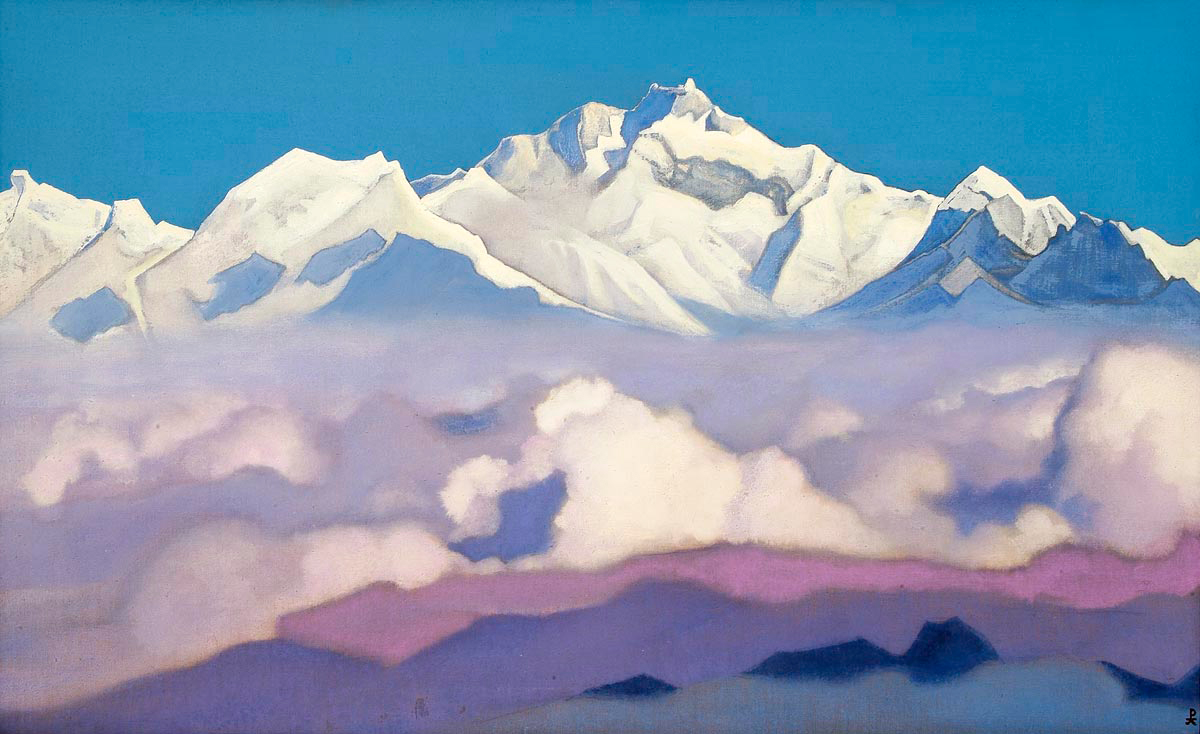
The solace, nourishment and underlying meaning
of everyday words
ALONE is a word that stands by itself, carrying the austere, solitary beauty of its own meaning even as it is spoken to another. It is a word that can be felt at the same time as an invitation to depth and as an imminent threat, as in ‘all alone’, with its returned echo of abandonment. ‘Alone’ is a word that rings with a strange finality, especially when contained in that haunting aggregate, ‘left all alone’, as if the state once experienced begins to define and engender its own inescapable world. The first step in spending time alone is to admit how afraid of it we are.
Being alone is a difficult discipline: a beautiful and difficult sense of being solitary is always the ground from which we step into a new and contemplative intimacy with the unknown, but the first portal of aloneness is often experienced as a gateway to alienation, grief and abandonment. To find ourselves alone or to be left alone is an ever-present, fearful and abiding human potentiality of which we are often unconsciously, and deeply, afraid …
The permeability of being alone asks us to reimagine ourselves, to become impatient with ourselves, to tire of the same old story and then slowly, hour by hour, to start to tell the story in a different way, as other parallel ears, ones we were previously unaware of, begin to listen to us more carefully in the silence. For a solitary life to flourish, even if it is only for a few precious hours, aloneness asks us to make a friend of silence, and just as importantly to inhabit that silence in our particular way, to find our very own way into our particular, and even virtuoso, way of being alone.
DEDICATED TO WORDS and their beautiful, hidden and beckoning uncertainties, Consolations is a meditation on the meanings we assign to the fundamental building blocks of the English language. With every locution chosen for its exacting sound and linguistic significance, David Whyte’s effortless and elegant prose transports us to otherworldly sentiments inspired by the very gods themselves.
Continuing in the great literary tradition of reflective discourse, championed by the likes of fellow travellers Michel de Montaigne, Francis Bacon, Ralph Waldo Emerson, Henry David Thoreau, Jack Kerouac and T. S. Eliot, Whyte’s 52 unique odes to the etymological nuances of everyday vocabulary—beginning with ALONE and closing with WITHDRAWAL—are utterly compelling in their scope, depth and tenor. With an introduction by Maria Popova, creator of the magnificent cultural online hub, The Marginalian, Consolations is yet another profound title offered to us by Canongate publishing house, whose singular aim is to uplift and enlighten the society in which we all live.
Born 2nd November 1955, the Anglo-Irish poet, who is perhaps better known for his poetry compositions, has also spoken himself of his inspiration for composing Consolations on the Waking Up platform, hosted by Sam Harris. With each essay restricted to 300 words and a single-word title, Whyte wanted to explore a theme that has fascinated him all his adult life, namely the way in which language is typically abstracted away from the physical experience to which it actually points. Citing Ludwig Wittgenstein, who posited that we cannot enter a world for which one is bereft of its diction, Whyte draws on his linguistic inheritance—the lyricism of Ireland combined with the frankness of West Yorkshire—in order to explore and expound the solace and sustenance of the semantic realm.
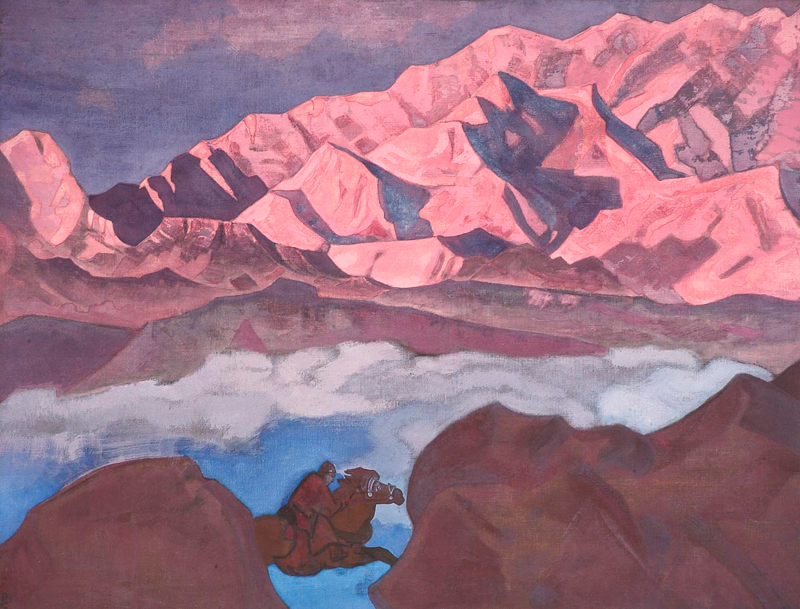
Nicholas Roerich, He Who Hastens.
Image: Public Domain
BEAUTY is the harvest of presence, the evanescent moment of seeing or hearing on the outside what already lives far inside us; the eyes, the ears or the imagination suddenly become a bridge between the here and the there, between then and now, between the inside and the outside; beauty is the conversation between what we think is happening outside in the world and what is just about to occur far inside us.
Beauty is an achieved state of both deep attention and self-forgetting: the self-forgetting of seeing, hearing, smelling or touching that erases our separation, our distance, our fear of the other. Beauty invites us, through entrancement, to that fearful frontier between what we think makes us; and what we think makes the world. Beauty is almost always found in symmetries and intriguing asymmetries: the symmetries and asymmetries seen out in creation, the wings of the moth, the airy sky and the solid earth, the restful, focused eyes of a loving face in which we see our own self reflected: the symmetry also, therefore, of bringing together inner and outer recognitions, the far horizon of otherness seen in that face joined to the deep inner horizon of our own being. Beauty is an inner and an outer complexion living in one face.
Beauty especially occurs in the meeting of time with the timeless; the passing moment framed by what has happened and what is about to occur: the scattering of the first spring apple blossom, the turning, spiralling flight of a curled leaf in the falling light; the smoothing of white sun-filled sheets by careful hands setting them to air on a line, the broad expanse of cotton filled by the breeze only for a moment, the sheets sailing on into dryness, billowing toward a future that is always beckoning, always just beyond us. Beauty is the harvest of presence.
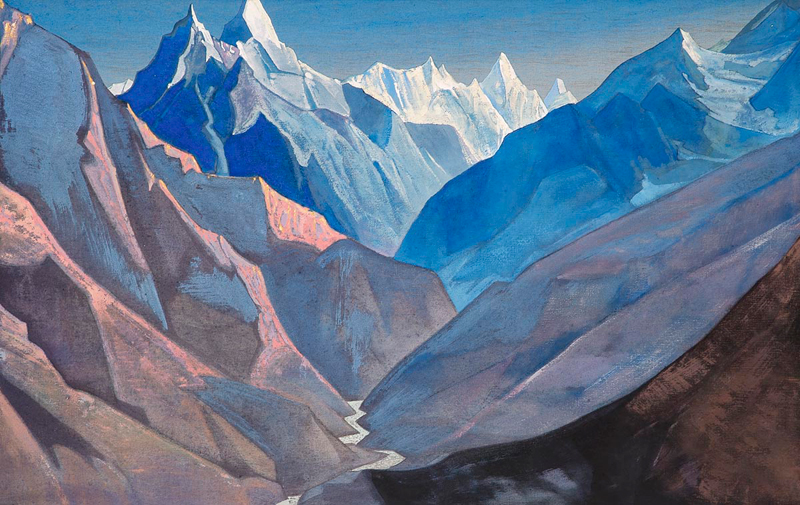
Nicholas Roerich, Mount “M”.
Image: Public Domain
GRATITUDE is not a passive response to something we have been given; gratitude arises from paying attention, from being awake in the presence of everything that lives within and without us. Gratitude is not necessarily something that is shown after the event; it is the deep, a priori state of attention that shows we understand and are equal to the gifted nature of life.
Gratitude is the understanding that many millions of things come together and live together and mesh together and breathe together in order for us to take even one breath of air, that the underlying gift of life and incarnation as a living, participating human being is a privilege, that we are miraculously part of something, rather than nothing. Even if that something is temporarily pain or despair, we inhabit a living world, with real faces, real voices, laughter, the colour blue, the green of the fields, the freshness of a cold wind, or the tawny hue of a winter landscape.
To see the full, miraculous essentiality of the colour blue is to be grateful with no necessity for a word of thanks. To see fully the beauty of a daughter’s face is to be fully grateful without having to seek a God to thank him. To sit among friends and strangers, hearing many voices, strange opinions; to intuit inner lives beneath surface lives, to inhabit many words at once in this world, to be a someone amongst all other someones, and therefore to make a conversation without saying a word, is to deepen our sense of presence and therefore our natural sense of thankfulness that everything happens both with us and without us, that we are participant and witness all at once.
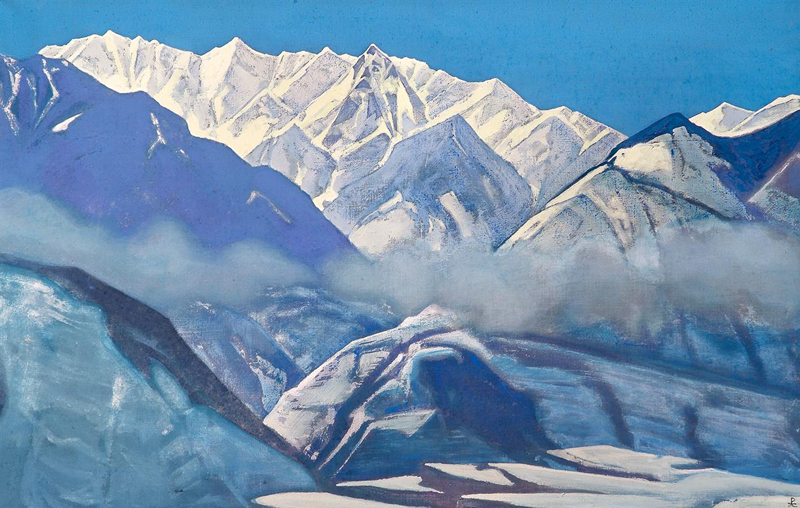
Nicholas Roerich, Devita.
Image: Public Domain
NAMING too early is a beautiful but harrowing human difficulty. Most of our heartbreak comes from attempting to name who or what we love, and the way we love, too early in the vulnerable journey of discovery.
We can never know in the beginning, in giving ourselves to a person, to a work, to a marriage or to a cause, exactly what kind of love we are involved with. When we demand a certain, specific kind of reciprocation before the revelation has flowered completely, we find ourselves disappointed and bereaved, and in that grief may miss the particular form of love that is actually possible but that did not meet our initial and too specific expectations. Feeling bereft, we take our identity as one who is disappointed in love, our almost proud disappointment preventing us from seeing the lack of reciprocation from the person or the situation as simply a difficult invitation into a deeper and as yet unrecognisable form of affection …
We name mostly in order to control, but what is worth loving does not want to be held within the bounds of too narrow a calling. In many ways love has already named us before we can even begin to speak back to it, before we can utter the right words or understand what has happened to us, or is continuing to happen to us: an invitation to the most difficult art of all, to love without naming at all.
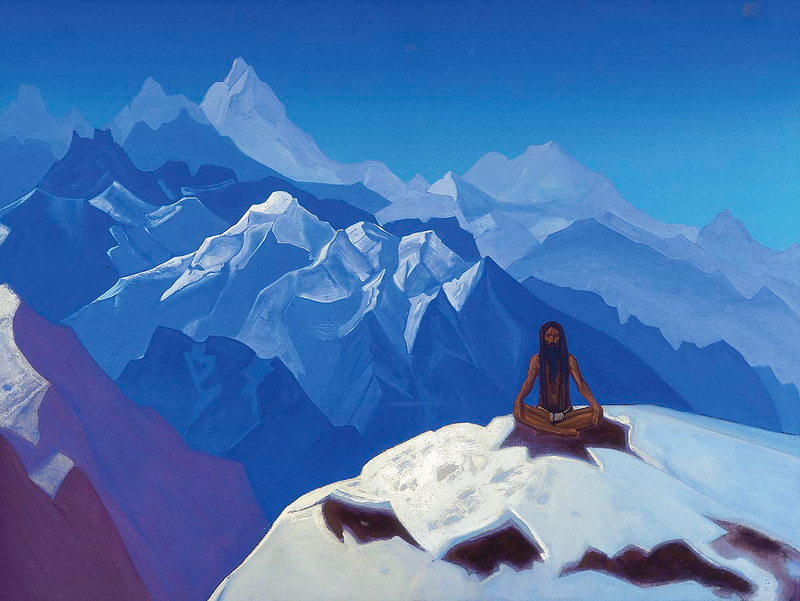
Nicholas Roerich, On the Heights (Tumo).
Image: Public Domain
PILGRIM is a word and a name that every human being might be given, at least temporarily as an accurate assessment of their essence: a stranger to be waved at in passing, or met along the way; someone always passing through very quickly; a someone on their way to somewhere else, never quite knowing whether the destination or the path stands first in importance; someone who underneath it all doesn’t quite understand from whence they came or quite where they are going, and many times from where their next bite of bread will come; someone dependent on help from other strangers and from those who will meet them along the way.
Travelling toward a place over the horizon, a pilgrim is almost by definition someone abroad in a world of impending revelation, where something is always about to happen or be revealed, including, most fearfully, and as part of their eventual arrival, a strange rehearsal for their own disappearance …
The defining experience at the diamond-hard centre of reality is eternal movement as beautiful and fearful invitation: a beckoning dynamic, asking us to move from this to that. The courageous pilgrim life is the life that is equal to this unceasing tidal and seasonal becoming: and surprisingly, beneath it all, stillness, a friendship with silence being the only proper physical preparation for joining the breathing autonomic exchange of existence.
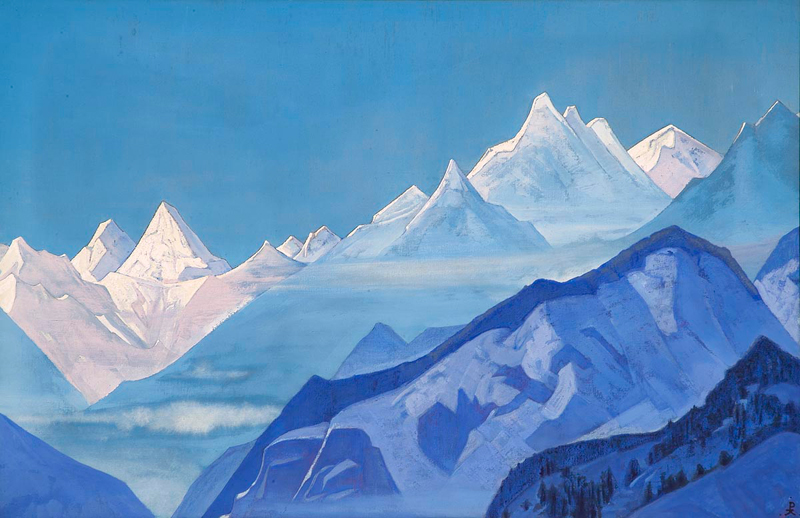
Nicholas Roerich, Guru Guri Dhar.
Image: Public Domain
SELF-KNOWLEDGE is not fully possible. We do not reside in a body, a mind or a world where it is achievable or, from the viewpoint of being interesting, even desirable. Half of what lies in the heart and mind is potentiality, resides in the darkness of the unspoken and unarticulated and has not yet come into being; this hidden, unspoken half of a person will supplant and subvert any present understandings we have about ourselves …
The hope that a human being can achieve complete honesty and self-knowledge with regard to themselves is a fiction and a chimera, the jargon and goals of a corporate educational system brought to bear on the depths of an identity where the writ of organising language does not run.
Self-knowledge includes the understanding that the self we want to know is about to disappear. What we can understand is the way we occupy this frontier between the known and the unknown, the way we hold the conversation of life, the figure we cut at that edge, but a detailed audit of the self is not possible and diminishes us in the attempt to establish it. We are made on a grander scale, half afraid of ourselves, half in love with immensities beyond any name we can give.
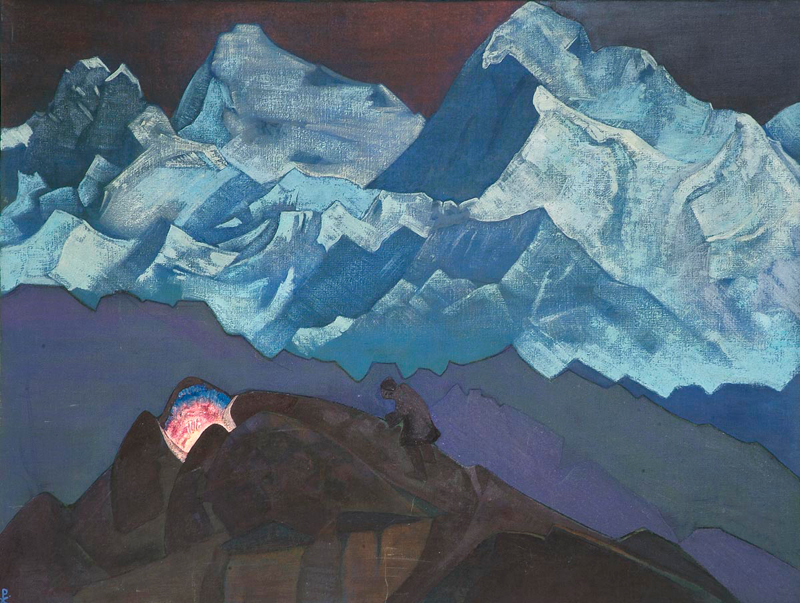
Nicholas Roerich, Fire Blossom.
Image: Public Domain
WITHDRAWAL can be the very best way of stepping forward, and done well—a beautiful, freeing act of mercy—and as an art form, underestimated in this time of constant action and engagement. So much of what we are involved with, in even the highest cause, becomes involvement at the busy periphery, where the central conversation has been lost to the outer edges of what was, to begin with, a very simple central invitation. Withdrawal is often not what it looks like—a disappearance—no, to withdraw from entanglement can be to appear in the world again in a very real way and begin the process of renewing the primary, essential invitation again.
Though life does seem determined to be a beautiful and entrancing distraction—just as we ourselves are a distraction to others, testing them as we test ourselves and our mutual sincerity—our participation in this dance of distraction also makes more real, and more necessary, our ability to return to essential ground, to an essential person or an essential work.
We stick to the wrong thing quite often, not because it will come to fruition by further effort but because we cannot let go of the way we have decided to tell the story, and we become further enmeshed even by trying to make sense of what entraps us, when what is needed is a simple, clean breaking away …
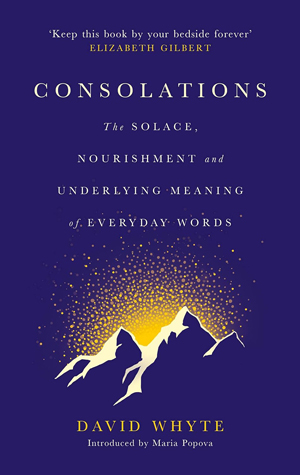
Post Notes
- Feature image: Nicholas Roerich, Kanchenjunga, Public Domain
- David Whyte’s website
- The Marginalian
- Waking Up
- Canongate
- Matsuo Bashō: Deep Silence
- Matsuo Bashō: The Narrow Road to the Deep North
- Ralph Waldo Emerson: The Over-Soul
- Ralph Waldo Emerson: Waldeinsamkeit
- Ralph Waldo Emerson: Nature
- Wassily Kandinsky: Concerning the Spiritual in Art
- Rollo May: My Quest for Beauty
- Alan Watts: Cloud-Hidden, Whereabouts Unknown
- Jack Kerouac: Alone on a Mountaintop
- The Culturium uses affiliate marketing links via the Amazon Associates Programme
